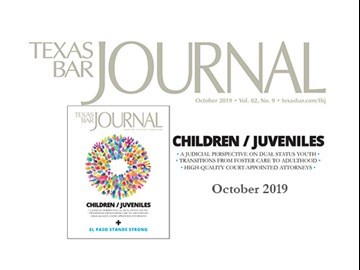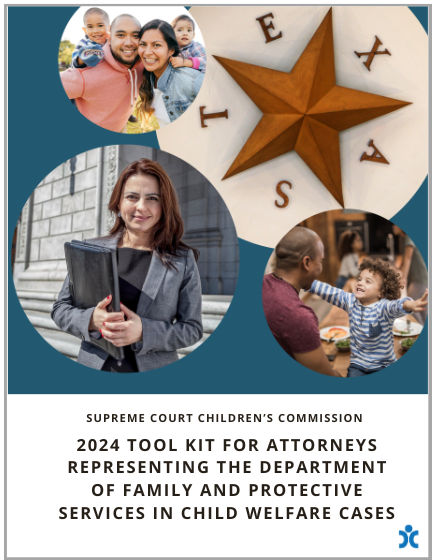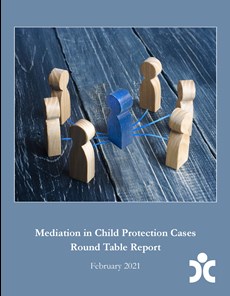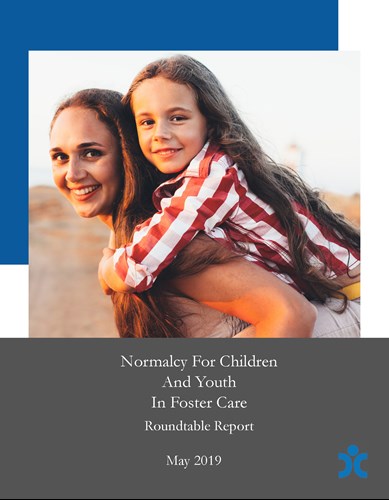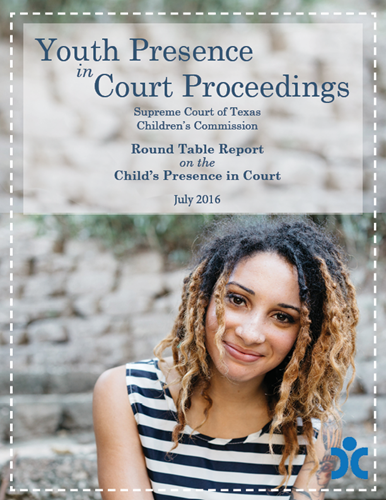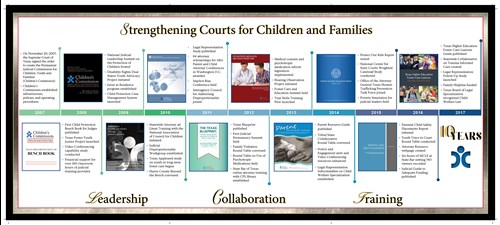2024 Tool Kit for Attorneys Representing the Texas Department of Family & Protective Services in Child Welfare Cases
Reports & Resources By Topic
The Children’s Commission maintains this resource webpage to share child welfare-related information. To get notified of new resources, subscribe below to receive the Resource Letter.
Materials published on the Children’s Commission website are helpful reports and resources for judges and attorneys handling child welfare cases and are intended for reference use only. This information not legal advice and does not represent the official opinion of the Supreme Court Children’s Commission. The inclusion of external links is not an endorsement by the Children’s Commission of the content associated with the resource. The Children’s Commission reserves the right to decline requests for the addition of external resources.
Tool Kit for Attorneys Representing DFPS
Reports & Resources by Topic
2025 Bench Book, Bench Cards and Checklists, & Topical Sections
Bench Book
The 2025 Texas Child Welfare Law Bench Book (updated January 2025) is available in the following formats:
- On LawBox:
- desktop computer Online and Interactive
or - by downloading the mobile application, LawBox:
- desktop computer Online and Interactive
Bench Cards
Bench Cards are abbreviated reference cards on specific hearing types and relevant topical matters for quick reference. Many Bench Cards are available in two formats: as one-page checklists without citations (short) which are intended for easy use at hearings and as extended versions with Texas Family Code citations.
- At a Glance: short
- Required Participation in Services Hearing: short / with citations
- Adversary Hearing: short / with citations
- Status Hearing: short / with citations
- Permanency Hearing Before Final Order: short / with citations
- Final Hearing for Non-Jury Trial: short / with citations
- Permanency Hearing After Final Order: short / with citations
- Reasonable Efforts: with citations
- De Novo Hearing: with citations
- Termination Grounds: with citations
- Foster Care and Education: with citations
- Medical and Mental Health Care: with citations
- Indian Child Welfare Act (ICWA): with citations
- Human Trafficking: with citations
- Required Court Admonishments: with citations
- American Bar Association Judicial Bench Cards for Engaging Youth in the Courtroom
- Bench Cards for Engaging Young Children (ages 0-12 Months)
- Toddlers (1-3 years) and Preschoolers (3-5 years)
- School-Age Children (5-11 years)
- Adolescents (12-15 years)
- Older Adolescents (16+ years)
Child Protection Court Resources
The Children’s Commission partners with or supports individual court efforts seeking to adopt specialized practices or programs. For more information about our work in child protection courts, please visit the Specialty Courts webpage.
- Child Protection Courts
- Notice & Engagement Hearing Notification Tool:
For more information about our work in Dual Status, please visit the Dual Status Task Force page.
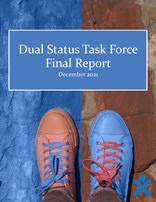
For more information, please visit Foster Care & Education webpage.
- School of Origin Determinations for Students in Foster Care
- Top 10 Things to Know About Education for Children in Foster Care in Residential Treatment Centers (RTCs)
- Support for Foster Alumni: Financial Aid, Enrollment Process & Campus Support
- Foster Care & Student Success: Texas Data and Trends 2018 - Educational Experiences, School Stability, and Academic Achievement
- Texas Education and Training Voucher (ETV) Program
- Frequently Asked Questions: Education & Training Voucher
- State College Tuition Waiver
- Frequently Asked Questions: Tuition Waiver
- Interested in furthering your education? Information sheet for current or former youth in care created by CitySquare
- Texas Child Welfare Law Bench Book:
- Resource Letter for Judges and Attorneys Handling Child Protective Services Cases: Educational Resources for the 2025-2026 School Year
The Texas Blueprint:
- The Texas Blueprint: Transforming Education Outcomes For Children & Youth In Foster Care
- Texas Blueprint Implementation Task Force Final Report
- ABA Child Law Practice: The Texas Blueprint - A Model for Improving School Experiences for Children in Foster Care
2018 Foster Care & Education Summit
In July 2018, Texas hosted its second Foster Care and Education Summit. The 2018 Summit provided an opportunity to look at past accomplishments, assess current challenges, and build momentum going forward. Teams attended from every region in Texas and they included advocates, attorneys, child welfare and education professionals, foster care alumni, and judges. Key themes included using data to drive decisions, engaging youth in decisions that impact their lives, approaching students with a trauma-informed lens, and creating a college-going culture for children and youth in foster care.
Materials:
Texas Foster Care & Education Collaborative Reports:
- 2022 Foster Care and Student Success Resource Guide
- Foster Care College Tuition & Fee Waiver Process
- Infographic: Texas commits to transform education outcomes of students in foster care: Findings from the Texas Blueprint Implementation Data Workgroup
- Information Sharing Between Child Welfare and Schools: Maintaining Privacy and Promoting Educational Success, April 2017
- Regional CPS Education Consortia: The Building Blocks to Engaging Community Stakeholders
- Statewide Survey on Local Collaboration Summary and One-pagers (School, Caregiver, CPS, and Legal)
- Texas CASA: Educational Advocacy Toolkit
- Texas Higher Education Information and Resource Guide for Foster Care Liaisons, September 2018
- The Road to College: Texas Foster Youth & Post-Secondary Education
- Transition Planning Guide for Students in Foster Care Receiving Special Education Services, July 2018
Additional Foster Care & Education Resources
Contacts:
- Department of Family & Protective Services (DFPS):
- Education Service Center: Foster Care Champions
- Higher Education Foster Care Liaisons
- School Systems' Foster Care Points of Contact
Links:
- American Bar Association (ABA) Legal Center on Foster Children & Education
- Casey Family Programs
- Education Reach for Texans
- National Working Group on Foster Care & Education: Education Outcomes for Children in Foster Care National Fact Sheet
- Texas Association of School Administrators (TASA)
- Texas Association of School Boards (TASB)
- Texas Court Appointed Special Advocates (CASA)
- Texas Council of Administrators of Special Education (TCASE)
- Texas Department of Family and Protective Services (DFPS)
- Texas Education Agency Foster Care and Student Success Page (TEA)
- U.S. Department of Education: Students in Foster Care
Hearing Observation & Judicial Workload Reports
In 2014, the Children’s Commission conducted an observation and data collection study, called the Hearing Quality Observation Project, involving 164 child welfare hearings held across Texas. The primary purpose of the project was to establish a baseline about the quality of court hearings occurring in child welfare cases in Texas, including hearing factors such as timeliness and length, depth of issues discussed, party and judicial compliance with the Texas Family Code, parental due process, party engagement, children’s appearance in court, attorney preparedness, and attorney and parent satisfaction with legal representation.
The 2015 National Center for State Courts (NCSC) Judicial Workload Study includes findings, a glossary that defines each hearing and case event, as well as a category type for each hearing type and case event.
Homelessness creates serious adverse conditions for children and youth, including medical and mental health, lack of school stability, physical safety, food insecurity, risk of exploitation and trafficking, and substance abuse.
Texas Appleseed, in partnership with Weatherford International and Baker & McKenzie LLP, created the Homeless Youth Handbook. This handbook provides homeless youth with Texas-specific information about their rights, responsibilities, and available resources related to every major aspect of their lives, including education, employment, health, housing, parenting, and other major topics.
Human Trafficking & Commercial Sexual Exploitation of Children (CSEC)
For more information, please visit the Commercial Sexual Exploitation of Children webpage.
- Webcast: The Texas Response to the Commercial Sexual Exploitation of Children
- "Be the One" digital training tool
- Child Welfare Information Gateway
- Human Trafficking and Child Welfare: A Guide for Child Welfare Agencies
- National Judicial Institute on Domestic Child Sex Trafficking - Online Resources
- Polaris Project
- Resource Letter for Judges and Attorneys Handling Child Welfare Cases:
- January 2024: January is Human Trafficking Prevention Month
- Texas Child Welfare Law Bench Book:
Indian Child Welfare Act (ICWA)
For more information about the Children's Commission's work on ICWA, please visit the Tribal/State webpage.
Children's Commission Resource Links:
- 2021 Texas Indian Child Welfare Act Summit replay videos and
- Resource Letter for Judges and Attorneys Handling Child Protective Services Cases:
- July 2021: Update on the Status of ICWA in Texas
- August 2019: Update on the Status of ICWA in Texas
- December 2018: Update on the Status of ICWA in Texas
- November 2018: Update on the Status of ICWA in Texas
- March 2017: ICWA Quick Reference Tools for State Courts
- Texas Child Welfare Law Bench Book
- Tool Kit for Attorneys Representing DFPS in Child Welfare Cases Chapter: ICWA
- Tool Kit for Attorneys Representing Parents and Children in Child Welfare Cases Chapter: ICWA
External Resource Links:
- Guidelines for Implementing the Indian Child Welfare Act
- Bureau of Indian Affairs FAQ on Final Rule for ICWA Proceedings Bureau of Indian Affairs FAQ on Final Rule
- ICWA Guide for Tribal Governments and Leaders
- NCJFCJ Indian Child Welfare Act Judicial Bench Book
- Quick Reference Sheet on Active Efforts
- Quick Reference Sheet for State Courts
- Quick Reference Sheet for Voluntary Proceedings
- Sample Notice Form
- Sample Parental Consent Form
- Sample Withdrawal of Consent Form
For more information about our work in legal representation, please visit the Legal Practice & Process webpage.
Recent publications:
2024 Tool Kit for Attorneys Representing the Department of Family and Protective Services in Child Welfare Cases

The 2024 Tool Kit for Attorneys Representing the Department of Family and Protective Services in Child Welfare Cases is now available in the following formats:
- Online and Interactive; also available by downloading the mobile application, LawBox:
- PDF
Pamphlet: Fathers' Rights in CPS Cases: What You Need to Know
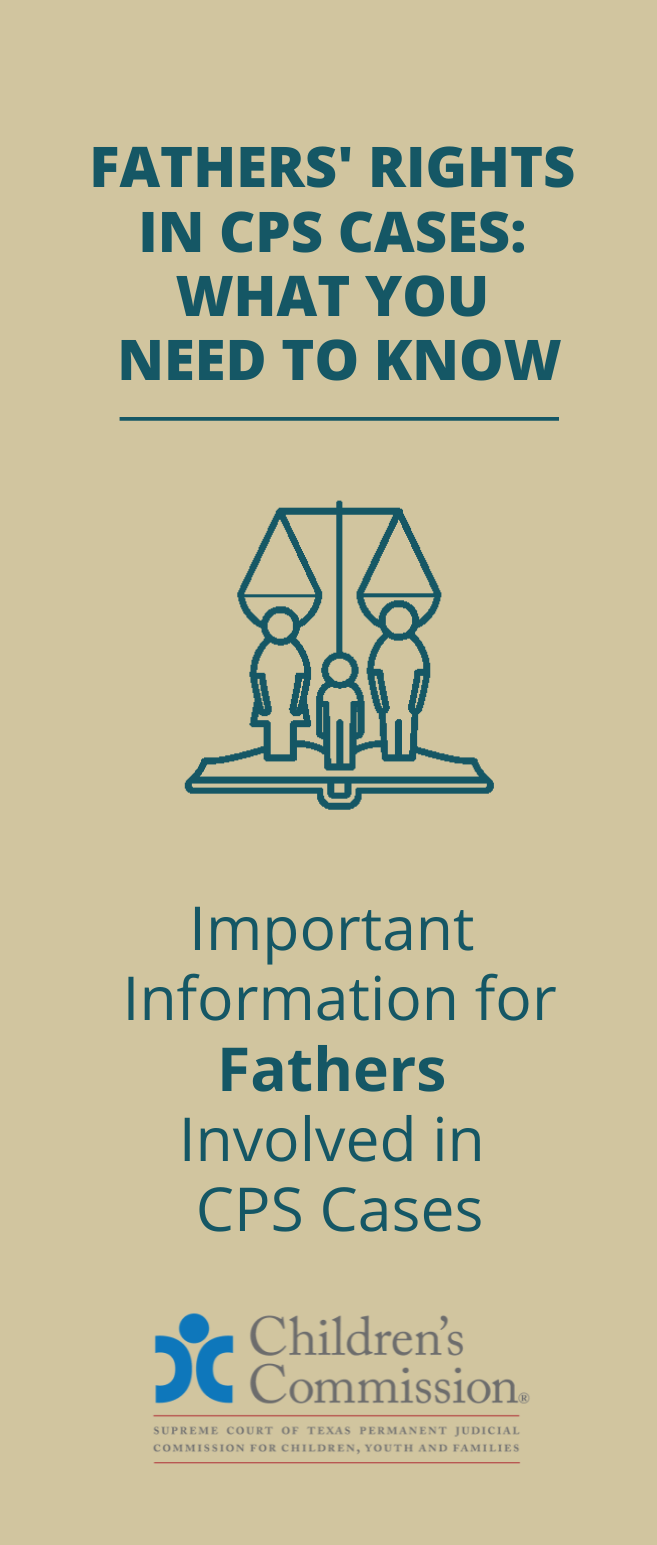 The Children’s Commission Legal Representation Committee has completed a resource pamphlet highlighting fathers’ rights when involved in a CPS case. Modeled after the Commission’s What Does a Parent’s Attorney do in a CPS Case? pamphlet, Fathers' Rights in CPS Cases: What You Need To Know uses accessible language to inform fathers of their basic rights in child welfare legal proceedings and explains the different legal statuses for fathers. The pamphlet is available for PDF download below.
The Children’s Commission Legal Representation Committee has completed a resource pamphlet highlighting fathers’ rights when involved in a CPS case. Modeled after the Commission’s What Does a Parent’s Attorney do in a CPS Case? pamphlet, Fathers' Rights in CPS Cases: What You Need To Know uses accessible language to inform fathers of their basic rights in child welfare legal proceedings and explains the different legal statuses for fathers. The pamphlet is available for PDF download below. - PDF: Father's Rights in CPS Cases: What You Need to Know
-
Rights of Incarcerated Parents in CPS Cases
The Children’s Commission Legal Representation Committee developed a poster as a resource highlighting the rights of incarcerated parents in a CPS case. This resource identifies basic rights in child welfare legal proceedings and explains how parents can participate in the case and in their child’s life, subject to the rules of the institution where they are incarcerated. The poster is available for PDF download below:
Rights of Incarcerated Parents
Video Series: Youth Voice Videos Explaining the Attorney-Client Relationship
“Your Lawyer Works for You” is a two-part video series designed for youth to explain the attorney-client relationship. The videos are a collaboration between the Children’s Commission and the Texas Network of Youth Services (TNOYS) Young Adult Leadership Council (YALC) and features young adults formerly in foster care discussing their experiences with their attorneys, articulating basics about the attorney-client relationship, and helping youth understand how to resolve problems with their attorneys. The videos are available on the Children’s Commission's YouTube Youth Voice Playlist and the TNOYS YouTube Channel.

2024 Tool Kit for Attorneys Representing Parents and Children in Child Welfare Cases
- Online and Interactive; also available by downloading the mobile application, LawBox:
Coloring Book: Sam and the Search for Spots - How Your Lawyer Can Help You
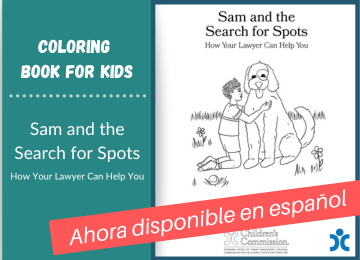
The Children’s Commission Legal Representation Committee created a coloring book designed to help children ages 6-12 understand the role of an attorney ad litem for a child and the attorney-client relationship in a child welfare case. The coloring book was developed by a workgroup which included law professors, board-certified child welfare law experts, and youth with lived experience in foster care and is designed to help children and caregivers discuss what makes an attorney ad litem for the child different from other people in the child’s case and how the attorney can help the child during the case through counseling and advocacy.
This publication is available in two formats at the links below: to print on a personal device, and for commercial print.
in English:
- 8.5x11 Standard Print (For home or office standard print)
- 12x18 Commercial Printer Spreads (For professional commercial print)
in Spanish:
- 8.5x11 Standard Print, Spanish (For home or office standard print)
- 12x18 Commercial Printer Spreads, Spanish (For professional commercial print)
For assistance or inquiries about this publication, please contact Jessica Arguijo at children@txcourts.gov.
Brochures Explaining the Attorney’s Role for Parents and for Children in a Child Welfare Case
These brochures explain the responsibilities of an attorney for a parent or child towards their client and how to resolve issues between the attorney and the client. The brochures are intended to be shared with parents and foster parents in child welfare cases and may be helpful for judges to have available in the courtroom and/or a courthouse library or information center.
Publications:
Judicial Guide:
Standards of Practice:
-
- American Bar Association Standards of Practice for Attorneys Who Represent Children in Abuse and Neglect Cases
- American Bar Association Standards of Practice for Attorneys Representing Parents in Abuse and Neglect Cases
- American Bar Association Standards of Practice for Lawyers Representing Child Welfare Agencies
- NACC Recommendations for Legal Representation of Children and Youth in Neglect and Abuse Cases
For more information, please visit the Mediation webpage.
- Mediation in Child Protective Services Cases Round Table Report
- Cost Analysis of Mediation in Travis County Family Court, November 2015
- Using Mediation Effectively in Child Protection Cases, June 2014 Presentation at CWJC by Cynthia Bryant and Cynthia Osborne, University of Texas
For more information about current projects, please visit the Parent Resources Workgroup webpage.
The Parent Resource Guide
The Parent Resource Guide is a handbook designed to help parents understand the Texas child welfare system, their roles and responsibilities when involved in a Child Protective Services case, and the roles and responsibilities of others. The guide is current up to the 86th Legislative Session.
The 2020 Parent Resource Guide is available below in English and Spanish:
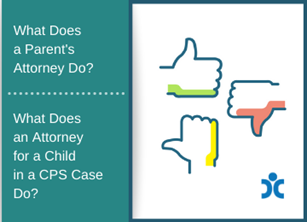
The following brochures explain the responsibilities of an attorney for a parent or child towards their client and how to resolve issues between the attorney and the client.
- PDF: What Does an Attorney for a Parent do in a CPS Case?
- PDF: What Does an Attorney for a Child or Youth do in a CPS Case?
- PDF: Fathers' Rights in CPS Cases: What You Need to Know
The Family Helpline
In 2017, the Children’s Commission partnered with Access to Justice and the Children’s Justice Act to fund the Texas Legal Services Corporation to establish the Family Helpline for Strong Families and Safe Children (“Family Helpline”), which provides easily available, statewide access for parents, family members, and community members to basic information, education, and resources addressing issues facing parents and caregivers as they relate to child welfare law including:
- Child Protective Investigations;
- The provision of Family-Based Safety Services;
- Safety Plan and Parental Child Safety Placements;
- Chapter 34 non-parent agreements;
- Termination of parental rights;
- Custody, access, and visitation;
- Service plans;
- The court’s role in conducting hearings and oversight;
- The right to legal counsel;
- Non-offending parents, minor parents, and incarcerated parents;
- Survivors of family violence;
- Intergenerational issues;
- Reinstatement of parental rights; and
- Other variations of these situations.
The Family Helpline is staffed by experienced attorneys who offer callers live support in a one-on-one exchange. TLSC employs attorneys with child welfare case experience who can offer callers legal information and education and refer to resources such as the Children’s Commission’s Parent Resource Guide, but not offer legal advice or establish an attorney-client relationship with the caller.
For more information on the Family Helpline, visit TexasLawHelp.org
- Protect Our Kids Commission Report
- Family Support Services, Texas HHS
- Resources for Raising Kids, Early Childhood Texas
- Parenting Tips for Children of All Ages, DFPS
- 2023/2024 Prevention Resource Guide, Children's Bureau
- Keeping Children Safe: Prevention a More Prevalent Approach to Address Child Abuse, Neglect, Texas Medical Association
Round Table Discussions & Special Reports
Round Table discussions are designed to address key, urgent issues affecting the Texas child welfare system through a half-day program that is facilitated by a subject-matter legal expert. The topics vary year to year and the number of Round Tables hosted each year also varies according to the interest of stakeholders and issues demanding attention. The Children’s Commission’s role usually consists of forming a small workgroup to discuss the overall purpose, creating an invitation and distribution list, securing a venue, handling all invitations, RSVPs, and travel reimbursements, and producing a written report or paper within six months following the event.
Special Reports
Senate Bill 1575 (87th Regular Session) Report to the Legislature
Round Table Discussions
|
|
|
|
|
|
|
|
|
|
|
|
|
|
|
|
|
|
|
For more information about our work in Trauma-Informed Care, please visit the Statewide Collaborative on Trauma-Informed Care page.
- TraumaInformedTexas.com includes resources created in whole or in part by members of the Statewide Collaborative on Trauma-Informed Care (SCTIC) as well as resources from other state and national organizations.
- Building a Trauma-Informed Child Welfare System: A Blueprint (available upon request)
- In collaboration with the Children’s Commission, the Texas Alliance of Child and Family Services (TACFS) published Building a Network of Trauma Informed Courts in Texas which highlights the work and the resources created by the Trauma-Informed Courts Pilot Project.
- Building a Network of Trauma Informed Courts in Texas
- February 8th, 2019 Commission Meeting PowerPoint Presentation
- Judicial Trauma Institute Videos and Materials - The Judicial Trauma Institute was presented live on April 22-23, 2021 via webcast. The content was designed by Commission staff in partnership with the Statewide Collaborative on Trauma-Informed Care (SCTIC) Training Workgroup and hosted by the Texas Center for the Judiciary. The goal of the conference was for judicial teams to gain information and discover practical tools and resources about how to become a trauma-informed and trauma-responsive court in CPS cases. Video replays and conference materials can be accessed on the Judicial Trauma Institute webpage.
Additional Resources:
- Texas Child Welfare Law Bench Book Chapters:
- Trauma-Informed Care Final Report, The Meadows Mental Health Policy Institute for Texas
The Texas Office of Court Administration (OCA) utilizes Zoom technology to support video conferencing for participating courts. For more information, please visit the Zoom Information and YouTube Support webpage provided by OCA.
For more information about the Children's Commission's work in youth voice and normalcy, please visit the Youth Voice & Normalcy webpage.
Your Lawyer Works for You! What You Need to Know
The Children’s Commission is pleased to announce a two-part video series designed for youth to explain the attorney-client relationship. “Your Lawyer Works for You.” The videos are a collaboration between the Children’s Commission and the Texas Network of Youth Services (TNOYS) Young Adult Leadership Council (YALC) and feature young adults formerly in foster care discussing their experiences with their attorneys, articulating basics about the attorney-client relationship, and helping youth understand how to resolve problems with their attorneys. The videos are available on the Children’s Commission's YouTube Youth Voice Playlist and the TNOYS YouTube Channel.
Helpful Resources
- Normalcy Matters: A Guide to Supporting Children & Youth in Texas Foster Care
- Companion video, Texas CASA
- Recommendations for Improving Permanency and Well-Being, Administration for Children and Families
- Normalcy for Children and Youth in Foster Care Roundtable Report
Texas Health and Human Services Commission, Foster Care Ombudsman:
For children and youth experiencing foster care, complaints can be submitted to the Foster Care Ombudsman. The Ombudsman is available to assist children and youth who report maltreatment in foster care and has the authority to conduct an investigation into individual complaints. Children and youth experiencing foster care may contact the Ombudsman by any of the following means:
- By phone: 1-844-286-0769; Monday – Friday, 8:00 a.m. to 5:00 p.m.
- Online form: Foster Care Ombudsman Online Submission Form
- By mail:
Texas Health and Human Services Commission
Foster Care Ombudsman, MC H-700
P O Box 13247
Austin, Texas 78711-3247 - Website
Guides and Handbooks:
- Texas Child Welfare Law Bench Book:
- Texas Foster Youth Justice Project Aging Out: A Guide For Youth and Young Adults with Experience in Foster Care In Texas, Ninth Ed.; 2024
- DFPS Foster Care Handbook for Youth:
- DFPS Rights of Children in Foster Care
- Texas Young Lawyers Association Strength in Unity
Websites for Youth in Foster Care:
- DFPS I am a Youth in Foster care webpage
- Foster Care Alumni of America
- Texas Foster Youth Justice Project
- Texas Network of Youth Services
- Preparation for Adult Living, Department of Family Protective Services Website
- Texas Youth Helpline
YouTube Channel & Archived Presentations
Children's Commission YouTube Channel
Topics
88th Legislative Session:
Please note that MCLE is not offered for this replay.
- 88th Legislative Session Update Video Replay
- 88th Texas Regular Legislative Session Report
- PowerPoint Presentation PDF
Effective Advocacy in the Virtual CPS Courtroom:
On May 22, 2020, the Children's Commission hosted a 90-minute webcast designed for all practitioners on the CPS docket to share best practices when preparing cases and clients for a virtual hearing. Moderated by Hon. Rob Hofmann, Judge of 452nd District Court and Jurist in Residence for the Children’s Commission, panelists discuss topics including how to facilitate the client’s meaningful participation in a virtual hearing; how to properly elicit testimony on Zoom; how to properly enter evidence on Zoom; and how to review orders in a virtual setting. Please note that MCLE is not offered for this replay.
Foster Care & Education:
- Understanding Support for Foster Alumni: Financial Aid, Enrollment Process & Campus Support
- Enhancing Support for Foster Alumni: Financial Aid, the Foster Care Tuition Waiver, and Campus Support
- Changes to Educational Services for Texas Foster Youth
- THECB Tuition and Fee Waiver: The tuition and fee waiver in the Texas Education Code offers eligible young adults the opportunity to attend any Texas public institution of higher education without the payment of tuition and fees. The video clarifies the eligibility criteria for the state tuition and fee waiver and explains how the waiver can be utilized in Texas.
Judicial Webcast on Benefits of Utilizing Technology in Child Welfare Cases
On June 5, 2020, the Children's Commission hosted a one-hour webcast, “Benefits of Utilizing Technology in Child Welfare Cases,” designed for judges who preside over the CPS docket. Moderated by Hon. Rob Hofmann, Judge of 452nd District Court and Jurist in Residence for the Children’s Commission, the panel discussion includes five judges who share their experiences with virtual child welfare hearings and related silver linings. Topics include how to manage dockets and find an interpreter; greater child and parent engagement; the advantages of virtual mediation; an increase in attorney participation and preparation; and the benefits of increased frequency of family time (also known as visitation). Viewers will also learn about how all of these technological benefits can be used to advance permanency for children in care. Please note that MCLE credit is not offered for this replay.
Prevention Before CPS Involvement
The majority of cases in the child welfare system involve neglect, which in some cases, conflate poverty and neglect. Families living in poverty are often faced with questions about resources for housing, mental health, food subsidies, parenting resources, substance use disorders, and/or job assistance. Resolution of these issues can also help maintain the safety, permanency, and well‐being of children. Prevention Before CPS Involvement: Supporting Families at Risk gives an overview of DFPS’s Prevention and Early Intervention services aimed at preventing child abuse and neglect at the community level and diverting families from child welfare involvement and introduces additional resources and community supports to further the goal of prevention. Please note that MCLE is not offered for this replay.
Youth in Court
CIP Reports & Orders
Additional Resources
Materials published on the Children’s Commission website are intended for reference use only. This information should not be construed as an advisory or ruling by or from the Supreme Court of Texas or any other court on specific cases or legal issues. The Children’s Commission does not endorse any external organizations or content in an associated resource. The Children’s Commission reserves the right to decline requests for the addition of external resources.
- Disability Rights Texas (formerly Advocacy, Inc.)
- Foster Care Ombudsman
- Office of the Attorney General
- Office of Court Administration:
- Office of the Governor
- State Bar of Texas
- Supreme Court of Texas
- Texas Indigent Defense Commission
- Texas CASA, Inc.
- Texas Center for the Judiciary
- Texas Council of Child Welfare Boards
- Texas Department of Family and Protective Services
- Texas Education Agency
- Texas Foster Family Association
- Texas Foster Youth Justice Project
- Texas Health & Human Services
- Texas Higher Education Coordinating Board
- Texas House of Representatives
- Texas Juvenile Justice Department
- Texas Lawyers for Children
- Texas Legal Services Center
- Texas Senate
- Texas Workforce Commission
- TexProtects, The Texas Association for the Protection of Children
National Resources
- American Bar Association Center on Children and the Law
- Casey Family Programs
- Child Welfare Information Gateway
- Legal Center for Foster Care & Education
- National Association of Counsel for Children
- National Center on Substance Abuse and Child Welfare
- National Council of Juvenile & Family Court Judges
Media
Media Contact:
Jessica Arguijo, Communications Manager
jessica.arguijo@txcourts.gov
512-463-7226
2021
Supreme Court Children's Commission Releases Report on Court-Appointed Legal Representation
Texas Bar Journal: October Edition, Children / Juveniles
- Two Doors to the Courthouse: A judicial perspective on dual status youth
- Legal Representation in Child Protective Services Cases: How do we ensure parents and children receive high-quality court-appointed attorneys?
- Representing Youth Clients: How to support successful transitions from foster care to adulthood
